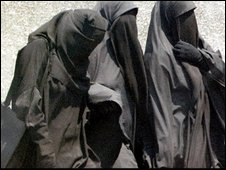 IN the midst of the intense uproar over the niqab (full- face veil),the Grand Sheikh of Al-Azhar,Egypt 's top Muslim cleric,has come under fire for ordering a schoolgirl to remove her niqab and later for banning the full-face veil in schools affiliated to Al-Azhar,the high- est seat of religious learning in the Sunni world. Even the most moderate of people were provoked when Sheikh Mohamed Sayyed Tantawi used tough words to force the 11-year-old girl to take the niqab off in class.When questioned by the media about this,Tantawi said that women were free to wear the niqab ,but not a girl of 11.He said that the niqab was acceptable at all the educational institutes affiliated to Al-Azhar,but not in the women-only classrooms,where schoolgirls and their female teachers must remove it
IN the midst of the intense uproar over the niqab (full- face veil),the Grand Sheikh of Al-Azhar,Egypt 's top Muslim cleric,has come under fire for ordering a schoolgirl to remove her niqab and later for banning the full-face veil in schools affiliated to Al-Azhar,the high- est seat of religious learning in the Sunni world. Even the most moderate of people were provoked when Sheikh Mohamed Sayyed Tantawi used tough words to force the 11-year-old girl to take the niqab off in class.When questioned by the media about this,Tantawi said that women were free to wear the niqab ,but not a girl of 11.He said that the niqab was acceptable at all the educational institutes affiliated to Al-Azhar,but not in the women-only classrooms,where schoolgirls and their female teachers must remove it
In so doing,the eminent Muslim cleric has neither taken a firm stand against the extremist image of Muslim pupils and students at Al-Azhar educational institutions that are supposed to symbolise moderate Islam,nor left females free to decide whether to wear the niqab or not.Tantawi's decision to ban the niqab in classrooms coincides with a similar ban at the dormitories of gov- ernmental universities,upon orders from the Minister of Higher Education.The official has cited security rea- sons as several men were caught disguised in the niqab inside the women-only hostels.There is rising public anger at the fact that the niqab is becoming more and more prevalent among Egyptian women and that it could lead to divisions in society.Most moderate Muslims blame Al-Azhar 's clerics for being silent for so long about this kind of dress,which is not Islamic,but rather the traditional dress of the Gulf states,especially Saudi Arabia.The men of Al-Azhar should tackle this problem in public debates and fora,where they could explain that the niqab is an old,traditional dress not suitable for city life.This would be better than tackling the trend with bans imposed by the authorities.



